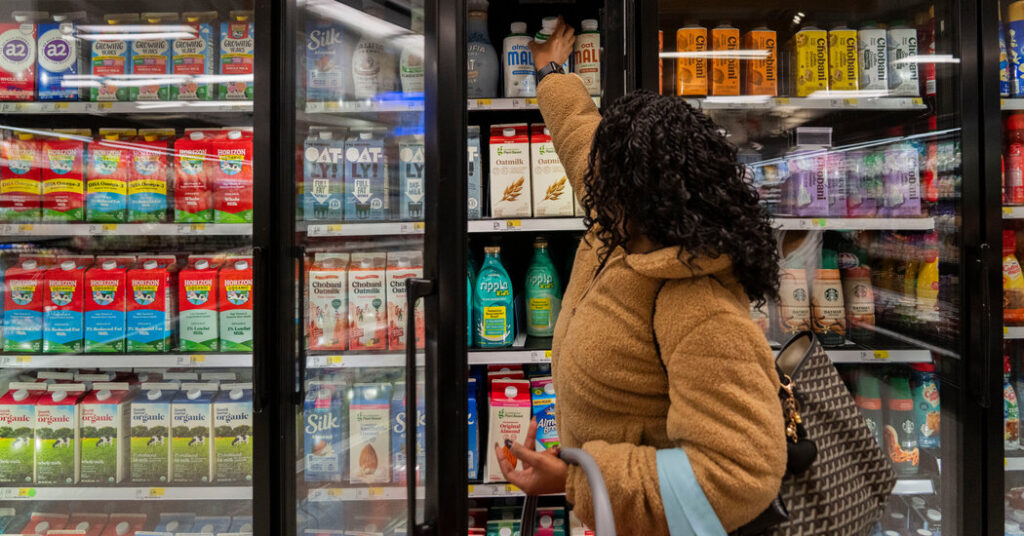The Trump administration said on Friday that it would lift tariffs on foreign products including beef, tomatoes, bananas and coffee to alleviate some of the price pressures consumers have faced since its global levies took effect.
The exemptions were applied immediately to certain “reciprocal” tariffs that President Trump placed on other countries’ exports in April.
The administration said it was taking the steps because it had already used the threat of tariffs to reach a critical mass of trade agreements. The United States said this week that it had agreed to deals with Switzerland, Argentina, El Salvador, Guatemala and Uruguay that would open up those markets for U.S. business.
But the steps also appear motivated by rising concern inside and outside the White House about consumer prices. Though Mr. Trump campaigned on lowering the price of groceries, continued elevated inflation has weighed on his approval ratings, and concerns about affordability helped propel Democrats to wins in elections across the country last week.
Administration officials had publicly discussed the idea of exempting goods that do not have major domestic U.S. producers, like coffee or bananas. But the list announced Friday evening appeared larger than expected and included some things produced in the United States, like bread, beef and orange juice.
Some analysts said the administration’s move on Friday was a tacit admission that it had pushed up prices in the first place — a basic tenet among economists that the administration has often denied or dismissed.
“Wait. If lowering tariffs lowers prices, what does raising tariffs do to prices?” Erica York, a vice president at the Tax Foundation, which has compiled estimates of the costs to consumers of the tariffs, wrote on social media.
Tariffs have acted with other forces to modestly boost food prices this year. Costs have risen more significantly for some products, like beef and coffee, the price of which has risen nearly 19 percent this year. That has been partly because of adverse weather, but tariffs of 50 percent on imports from Brazil and 20 percent on goods from Vietnam, major coffee growers, have not helped.
U.S. inflation has remained somewhat elevated and ticked up again in recent months, despite efforts by the Federal Reverse to bring it down. The central bank recently shifted to focusing more on maintaining the health of the labor market, after a rapid slowdown in monthly jobs growth.
The Trump administration has said tariffs would supercharge U.S. investment and production, creating jobs. But many economists say tariffs have contributed to higher prices and slower economic growth, by raising costs for U.S. businesses.
Tariffs appear to have had a somewhat muted effect on goods prices this year, as businesses hesitated to pass costs down to their customers. But more of the cost of tariffs has been passed on to consumers in recent months. Goods inflation is on the rise, a change from last year, and prices have increased notably faster for goods that are subject to tariffs than for goods with no levies applied.
The exemptions could upset some domestic producers who are in favor of tariffs and are important sources of support for Mr. Trump. Cattle ranchers have complained about the president’s efforts to bring beef prices down by increasing imports, saying it runs counter to Mr. Trump’s “America First” philosophy.
Karim Azzaoui, who represents an importer of hazelnuts and cashews called Balsu USA and is chairman of the board of the Association of Food Industries, said some commodities had risen so much in price that they had become unaffordable for lower-income shoppers. One example is olive oil, which has grown tremendously popular in the United States because of its health benefits.
“Now that the global prices are coming down this year, we tend to see that tariffs are artificially keeping prices high here,” Mr. Azzaoui said. “We didn’t see a drop in prices at the grocery level, because an American who is buying olive oil to improve their diet will still be priced out of the market.”
Lydia DePillis contributed reporting.
Ana Swanson covers trade and international economics for The Times and is based in Washington. She has been a journalist for more than a decade.
The post Trump Administration Lifts Some Food Tariffs in Effort to Ease Prices appeared first on New York Times.




